- Home
- Gavin Chappell
The Hadrian Legacy Page 13
The Hadrian Legacy Read online
Page 13
‘Is that so unlikely?’ Flaminius shrugged. ‘After all, why have we been brought here?’
Orgetorix laughed. ‘Not to become druids,’ he assured him. ‘You will be initiated, as I said, when Cucullata comes here from the Archdruid. As warriors of the druids. Once you have joined the elect, you will learn all there is to learn. That is,’ he added, ‘if Cucullata thinks you are suitable.’
‘And if she doesn’t?’ Flaminius asked.
Orgetorix looked away. ‘If not, you will be given to the gods.’
—21—
The following days continued as before, but a new tension hung over the windswept lanes of the drystone city. They were not the only ones to have heard of the imminent arrival of this druidess. Although they still had little contact with the citizens of the place, Drustica could tell that her companions were expectant.
‘Everyone knows something is about to happen,’ she told Flaminius one evening as they walked back from training.
He looked over at her. ‘So do we,’ he said, ‘but what?’
‘You know that,’ said Drustica in surprise. ‘This druidess, the envoy of the Archdruid. She will initiate us.’
‘If she thinks we’re worthy,’ Flaminius reminded her. ‘And then we’ll know what’s going on round here. But will she think we’re worthy? I don’t want to be given to the gods. I’ve seen human sacrifice recently and believe me, it’s not pleasant. I wouldn’t want it to happen to you.’
‘Nor would I want to see you sacrificed,’ she said, ‘but surely you’re not afraid?’
He looked at her, eyes hollow. ‘I’m afraid of many things,’ he said. ‘I’m afraid that whatever they’re planning spells no good for this province. I’m also afraid that Cucullata will not accept me as an initiate.’
Drustica had never thought that Flaminius was afraid of death.
‘Of course I am,’ he told her when she said this, ‘and so is any sane man. I’m also afraid for Britain. If we don’t learn what’s happening here and get that information to where it’s needed…’
He left the rest unfinished. After all, they still didn’t know what the druids planned. But he was right. It couldn’t mean anything good.
—22—
Deceangli country, 23 July
Junius Italicus rode from Deva into the western hills with an uneasy feeling.
Unable to think up a cover story, he had introduced himself to the tribune in charge of the camp as a Commissary centurion investigating the auxiliaries who had murdered the procurator. After all, Mithras expected his followers to tell the truth. The tribune had referred him to the prefect in charge of the auxiliaries, who he was surprised to recognise as a previous acquaintance. Marcius Magnus recognised him too.
Junius Italicus had twisted the man’s arm until he permitted him to question his men, but to little effect. None of the men who spoke to him seemed to have been present when the murder was carried out. Many denied that they had been part of the troop back then.
Marcius Magnus was little help. How he had become prefect of Dumnorix’s Troop was beyond Junius Italicus, although he strongly suspected strings had been pulled.
After days of fruitless investigation, the prefect had called Junius Italicus into his office.
‘You don’t seem to be getting very far,’ he said. Before Junius Italicus could reply, he added, ‘I’m sure that the murderers were one-offs, lone wolves.’ Two lone wolves, then? But a lifetime of loyal serviced to the legions stilled Junius Italicus’ tongue. ‘But since we returned to base, several patrols into the western hills have gone missing. Absent without leave or murdered by bagaudae, who knows. But men from my own troop have vanished. Perhaps this has some bearing on your case.’
‘Such as?’ Junius Italicus asked.
The prefect shrugged. ‘That’s not for me to decide,’ he said. ‘I’m not an imperial agent. But since you’ve achieved so little here, perhaps that is where you could direct your energies, centurion.’
Junius Italicus drew himself up. ‘Is that an order, sir?’
‘You’re damn right it’s an order,’ the prefect said. ‘I tire of you lounging about my barracks for weeks asking probing questions of innocent men. You would be better employed tracking down these bagaudae or deserters or whatever they transpire to be.’
‘You’re asking me to get out of your hair,’ Junius Italicus suggested.
‘Promptly,’ the prefect confirmed.
Junius Italicus set out the following day.
Speaking with the centurion commanding a fort in the foothills of the mountains, he learnt more about the desertions—although the man didn’t see them in those terms.
‘Those mountain valleys are a labyrinth,’ the centurion said. ‘Undermanned as we are, we can’t police them effectively. They’ve become a nest for bagaudae. That’s why patrols go missing, it’s no mystery.’
‘Have you ever seen these bagaudae?’ asked Junius Italicus. ‘Or spoken to anyone who has?’
The centurion shook his head. ‘No,’ he said. ‘But what other explanation can there be?’
‘A man I spoke to in Deva thought they were deserters,’ Junius Italicus replied.
The centurion scoffed. ‘Deserters? All of them? You don’t believe that, do you? They’d rather skulk in the hills than get paid, fed and have roofs over their heads?’
‘I’m a sceptic,’ Junius Italicus said. It was something he’d learnt from the Chief. ‘I believe nothing until I see the evidence.’
The centurion grunted. ‘If you mean to go up into the hills, I’d strongly suggest you don’t go on your own. Only recently a patrol passed through here, on their way to Segontium, and I’ve seen neither hide nor hair of them since. On your own, even a centurion of your standing couldn’t hope to prevail against bagaudae. Take some of my men.’
Junius Italicus thanked him, and next day he set out from the fort of Kanovium with an escort. Soon they were up among the peaks, proceeding north-west along a Roman road through the heather. His escort was made of six troopers—Kanovium was an auxiliary fort, of course—and he was worried when he realised that they were Gauls. But surely not all Gauls were traitors, deserters, or bagaudae!
An insolent bunch, though; surly with him, talking to each other in whispers throughout the journey. Junius Italicus wished he’d gone into the hills alone.
Things reached a head when they halted to water their horses and eat a midday meal. Nothing had happened so far. The closest to bagaudae Junius Italicus had seen were ravens circling above the crags. The moor was a vast, open, lonely wasteland. No sign of anyone, robber or deserter or shepherd or good honest Roman citizen. When Junius Italicus signalled his escorts to remount and continue, they refused.
‘What do you mean, no?’ the centurion said. ‘I’m going to report you all to your commanding officer the moment I get back to Kanovium!’
‘Are you sure about that, sir?’ asked a tall, gangling man with a thick beard.
‘Of course I’m sure.’ Junius Italicus remounted his own horse and glared down at them. ‘And if I had my vine staff with me, I’d be taking it to your back right now!’
‘Are you sure you’re getting back to Kanovium, sir, is what he means,’ said another, a burly fellow with a weaselly look to his eyes. Junius Italicus stared hard at him.
‘What do you mean?’
The man indicated the heather clad slopes on either side of the valley. They were lined with mounted warriors.
Keeping calm, Junius Italicus scanned the horizon. More riders trotted down to the road behind him, cutting off his retreat, even as he looked, but the way ahead stayed open. He dug his spurs into his horse’s flank and rode forwards, leaving the troopers behind.
More riders bolted down from the ridge to cut off his path. He drew his sword as they thundered towards him, then cursed. He was carrying his usual legionary short sword of Spanish pattern, not designed for fighting on horseback. The riders had longswords or lances, much like the troopers wh
o had escorted him. On looking over his shoulder, he saw the latter galloping after him.
He spurred his beast onwards, trying to squeeze out of it the utmost speed. Still the riders cantered down the heathery slope. The rest, his erstwhile escort included, raced after him. Up ahead, the road vanished over a rise.
Now he streaked ahead of the riders. He grinned. Their ambush had gone very wrong.
He crested the rise, and saw a distant view of the sea. The wind whipped around him. Wooded valleys wound up from the coast, withering into moorland several miles away. Crags loomed on either side, buzzards circled high above. Down the valley he rode.
He glanced over his shoulder. No sign of his pursuers, except one horseman, unmoving on the crest of the rise, watching him.
The view of the sea vanished shortly afterwards when mist descended. He was still riding, though he had slowed his pace since there was no sign of pursuit. Hearing a clatter of rock from the scree above him, he glanced up, expecting to see sheep or even some of the wild ponies he had noticed earlier. To his dismay, more riders—or were they the same ones? —galloped out of the mist.
He recognised them from his earlier encounter—and his erstwhile auxiliary escort was riding with them. He tried to kick more speed out of his horse but it was close to foundering. Before he could get any further the riders were around him. One grabbed his reins. He cut wildly at the rawhide with his short sword. Another man hauled him from the saddle.
The next thing he knew, he was draped over the back of a horse, possibly his own. He tried to struggle but he had been bound hand and foot. His head was ringing. He must have blacked out when his skull hit the road surface. He wondered which was more dented.
Raising his head, he saw a familiar gangling figure watching him from horseback. They were riding through the mist.
‘What are you getting out of this?’ he asked the auxiliary leader. ‘You won’t be able to return to your troop after this, you fool. Let me free and nothing more will be said.’
‘We’re joining another army,’ said the trooper boastfully. ‘And we’ll pay our way with you.’
Junius Italicus glanced around at the riders. They looked much like the Gaulish bagaudae he had encountered in the forest of the Carnutes. ‘You’ve deserted? Left Roman service for this? Your decurion was right—but why? What has this gang of cattle rustlers got that’s better than serving Rome?’ His eyes narrowed. ‘Wait. What do you mean, you’ll pay your way with me?’
The gangling man sawed at his reins and rode away into the mist. As Junius Italicus’ horse plodded after him, his words drifted back eerily, ‘The gods demand a sacrifice…’
—23—
City of the Druids, July 26
That night, a great commotion came from the walls of the city. The wind howled around the thatched roof of the hut where the troopers were incarcerated, and it was difficult to work out what was going on. Flaminius motioned for silence and they all listened.
Shouts, and cries, and bellowed orders floated thinly down the long wind. Then stamping feet, and a rumble of some wheeled vehicles crossing cobbles. The sounds died away, vanishing deeper into the city, but a hubbub remained for a while, before the wind grew too loud for any more to be heard. Presumably the people had returned to their huts.
‘What was all that about?’ Drustica said.
The city was usually quiet at night. Occasional sounds of feasting from the hall of skulls was about all that had disturbed their nights—that and the incessant moaning of the wind.
Bellomarus looked up. ‘You’ll find out,’ he said ominously, ‘soon enough.’
‘Sounds like we’ve got company,’ muttered Flaminius.
‘You mean…?’ Drustica said. Had Cucullata come, as promised?
‘I don’t know of anyone else likely to make such a dramatic entrance,’ Flaminius added as a guard crawled into the hut on hands and knees.
The newcomer crouched and looked hard at Bellomarus. ‘Bring them,’ he grunted. ‘Bring them to the stones.’
He shuffled back out again. Bellomarus looked around. ‘This is it, lads,’ he told them. ‘Time to meet our destiny.’
A small group of torch-bearing guards stood outside, their hair and Gaulish cloaks whipping in the wind, the one who had just spoken to the auxiliaries among them. The leader beckoned and led them out of the yard and into the cobbled lane that wound up the slope.
They trudged through the biting wind. The city was a scene of turmoil, torch bearing figures hurrying up the lanes towards the peak of the hill, where the three cairns stood. More figures stood up there, cowled figures—also holding torches, it transpired, as the troopers came out into the open space directly below the cairns.
The place was crowded with people, more people than Drustica had supposed lived in the city. Some were troopers; bagaudae, she supposed. Others she recognised as Caledonian warriors from beyond the Wall. All faced the cairns. Their excited mutterings died away into a silence broken only by the wind and the roar of the torches.
‘What are we waiting for?’ Drustica said.
Bellomarus caught her eye. ‘You’ll see,’ he repeated. ‘You’ll see.’
She looked questioningly at Flaminius, but he shook his head. ‘No doubt the optio knows what he’s talking about.’
She stood waiting with the others, shivering in the wind. This was a high, cold place. The sea reflected the stars. It was as if they stood on an island amid the night sky.
At a sigh from the crowd she looked up at the cairns. A figure stood in the shadow of the standing stone. It must have appeared from behind it, since there was no other way it could have appeared up there, but Drustica had not seen this happen. It was as if this figure, which now took a step forward into the guttering light of the torches, had appeared from nowhere.
It was tall but slender, like a sapling oak, but definitely human. A woman, from its curves. It wore a long Gaulish cloak that billowed out behind it, revealing dark clothes, and a glittering silver pectoral that emphasised its breasts.
Like the other druids, a cowl covered its face. The figure approached a robed druid and took the torch from the druid’s hand, raised the torch to its shadowed lips and to Drustica’s shock ate the flame whole. The figure flourished the blackened torch. Its flame was gone. Now she put it to her lips again and fire blazed forth from her mouth, reigniting the torch.
Another sigh came from the crowd and it was like the crashing of the sea upon a rocky shore.
Drustica saw Flaminius nodding wisely. ‘What is this trickery?’ she hissed.
A look was in his eyes that she had never seen before. ‘Magic,’ the Roman breathed. ‘She must be a magician.’
‘That is Cucullata,’ said Bellomarus from behind them. ‘Second only to the Archdruid himself.’
‘Who is the Archdruid?’ Drustica asked.
‘Nobody knows.’ Before Bellomarus could elaborate, another sigh throbbed from the crowd and Drustica saw Cucullata stride down from the cairn. The hooded woman stalked up and down the line, peering into the faces of her worshippers.
‘What is she doing now?’ Drustica asked.
‘Looking for traitors and spies.’
Drustica looked in alarm at Bellomarus, but the Gaul was intent on Cucullata, who was gliding up the line towards them. Flaminius watched her approach.
She stopped before him. ‘Who is this?’ Her voice boomed from beneath the cowl. Drustica’s heart pounded. Cucullata turned to regard her. ‘New recruits?’
‘We have been recruiting among the native Britons, my lady,’ said Bellomarus in a small voice. ‘As per orders.’
‘Silence!’ Cucullata said. ‘Let them speak. Do you know why you have been brought here? Any of you?’
‘For training,’ said Flaminius. ‘For initiation.’
‘For initiation,’ said Cucullata, ‘and much more. But can you be trusted? Britain has lain under the Roman yoke for many years, and what attempts have you made to free yourselves?’
‘Feeble!’ she boomed. ‘Pinpricks! Are you Britons so enervated you cannot throw off the yoke of the degenerate Romans?’
Drustica saw no reason to rebel against Rome, they had helped her people. But if they wanted to overthrow the Romans, she was sure they could do so with ease.
‘And what have the Gauls done for freedom?’ she demanded hotly. ‘You’ve been under the heel so long I’m surprised you remember what freedom smells like! You call Britons enervated, but I have been in Gaul, and I know what spineless wastrels the Gauls are.’
Cucullata drew close. ‘A hater!’ she said. ‘I like that. There’s spirit in you. But you’re a girl. What brings you here?’
‘Women still fight in the north, where we come from,’ Flaminius said. ‘Even if the Romans forbid it. We still hold true to the old ways.’
Cucullata laughed harshly. ‘Bitches and pups suckled at the teats of war,’ she purred. ‘You have promise, but a promise can be broken. You must prove yourselves.’ She stepped back and surveyed the lines of warriors.
‘You must all prove yourselves, new recruits,’ she added. ‘You must show that you hold true to the old ways. Women warriors, that is good. But the old ways hold so much more. Soon we shall bring them back everywhere. But those who fight for us must prove themselves before we make them privy to our mystery.’
‘So you say!’ Flaminius called out in a ringing voice. ‘But how will you bring back the old ways? And how can we prove ourselves?’
‘We will bring back the old ways in the old way,’ Cucullata said, undaunted by his challenge. ‘And it is by the old ways that you will prove yourselves. Gauls have joined us, aye, and Britons too. Both peoples followed the faith of the druids in the old days, just as folk still do in the islands of the west, and the countries north of the Wall. But what do you know of the old ways, you who have fought for the Romans? The ways of sacrifice!’

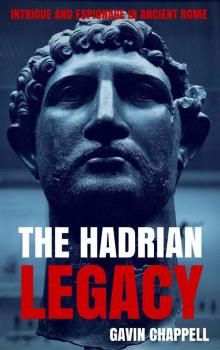 The Hadrian Legacy
The Hadrian Legacy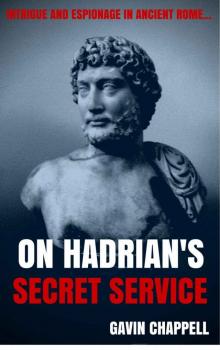 On Hadrian's Secret Service
On Hadrian's Secret Service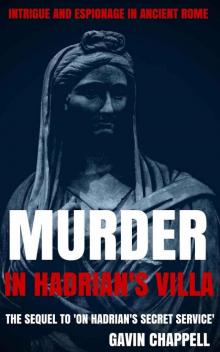 Murder in Hadrian's Villa
Murder in Hadrian's Villa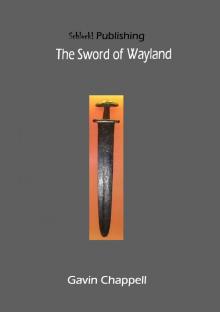 The Sword of Wayland
The Sword of Wayland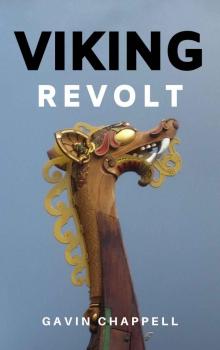 Viking Revolt
Viking Revolt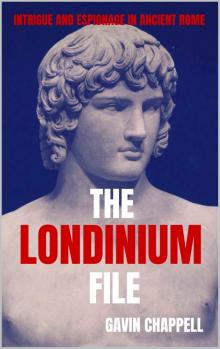 The Londinium File
The Londinium File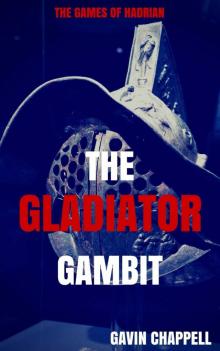 The Gladiator Gambit
The Gladiator Gambit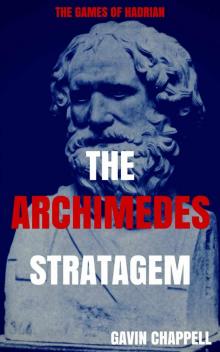 The Archimedes Stratagem
The Archimedes Stratagem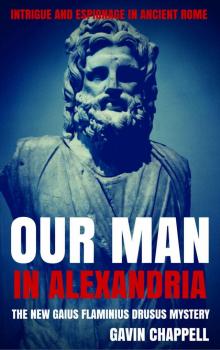 Our Man in Alexandria
Our Man in Alexandria Into the Void (The Dungeoneers)
Into the Void (The Dungeoneers)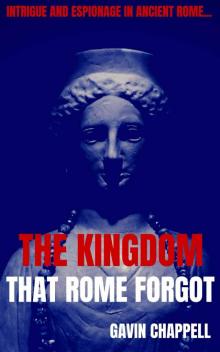 The Kingdom That Rome Forgot
The Kingdom That Rome Forgot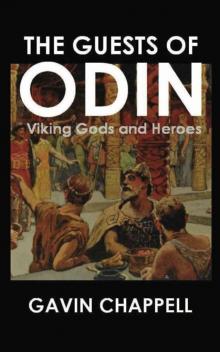 The Guests of Odin
The Guests of Odin